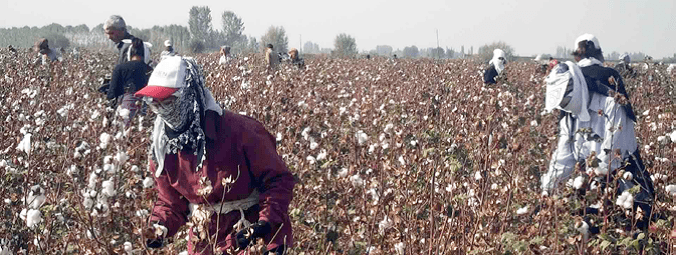Extortion and bribery fueled the forced labor behind Uzbekistan’s cotton harvest in autumn 2014, a coerced mass mobilization that took teachers, health care workers and millions of other employees away from their duties for several weeks, according to a report released today by the nonprofit Uzbek-German Forum for Human Rights.
While fewer children were pushed into the fields during the most recent harvest, the study found an unprecedented degree of extortion of individuals and businesses that included keeping people in fields even though there was no more cotton to pick so that workers had to continue to pay for room and board, and the setting of unattainable quotas so people had to pay to make up deficits.
“The Government’s Riches, the People’s Burden,” which builds on the Uzbek-German Forum’s preliminary findings last November, reports that the government mobilized more public employees in the 2014 harvest than in previous years, likely to make up for fewer child laborers. Uzbekistan has cut back on the use of child labor in the cotton fields, following worldwide condemnation—including by the U.S. State Department, which in October placed Uzbekistan among 12 countries with the worst forms of child labor.
“Students and the sick suffer during the harvest time,” says Nadejda Atayeva, president of the Association for Human Rights in Central Asia. “Schools and health clinics cannot function with so many staff sent to pick cotton. Students cannot receive the quality of education that they deserve, and medical care is inaccessible to people, even when they are very ill.”
At least 17 people died and numerous people were injured as a result of the cotton harvest and poor or unsafe working and living conditions, according to the report, which details how workers were forced to toil long hours picking cotton in unsafe and unhealthy working conditions that often included no access to clean drinking water. Workers were forced to live in garages, unused farm buildings or local schools in crowded and unsanitary conditions often without heat or hot water, even during cold weather at the end of the season.
The annual cotton harvest, estimated to exceed $1 billion, disappears into an extra-budgetary fund in the Finance Ministry to which only the highest-level officials have access, the report states.
“The enrichment of officials creates a powerful disincentive to enact real reforms of the cotton sector, and unlawful practices undermine the rule of law, nurturing an environment in which the government denies its use of forced labor and impunity prevails,” the report’s authors write.
The report concludes with specific recommendations for governments and nongovernmental organizations to address Uzbekistan’s abuses of human rights, including investigating and prosecuting companies that benefit from or contribute to the forced labor system of cotton production, which is in violation of international and national laws.
Experienced Uzbek-German Forum monitors, fluent in Uzbek, researched the cotton harvest and labor practices in the capital, Tashkent, and in six regions in Uzbekistan.

